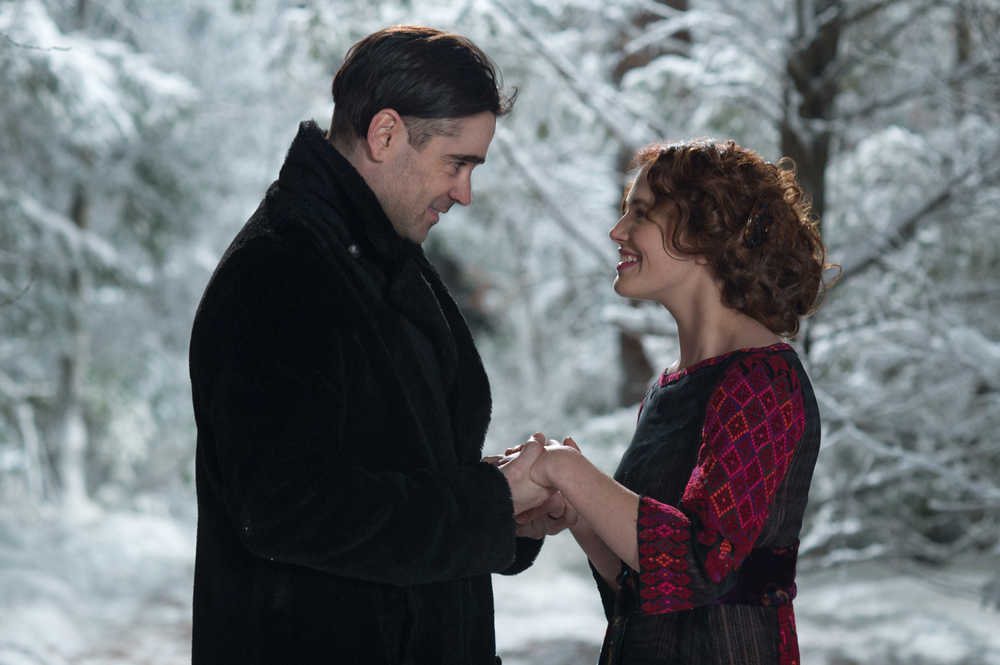“Winter’s Tale”
Village Roadshow Pictures
1 hour, 58 minutes
I’ve never read Mark Helprin’s 1983 novel, “Winter’s Tale,” upon which this week’s big screen romance is based, but I understand it has a rather strong following. After watching the movie, a charming and earnest mess starring Colin Farrell and Russell Crowe, I can see hints of a grand and beautiful love story — unfortunately hindered on the big screen by the necessity to depict whimsical fantasy elements in a very literal fashion. It’s just about the time that Farrell’s hero Peter Lake escapes from a vicious gang of toughs on a white horse which flies him to safety over the rooftops of turn-of-the-century New York City that you start to think, maybe, just maybe, this story should have stayed on the page.
The movie doesn’t really work, but it’s not for a lack of trying. Farrell, who has always reminded me of a cartoon character, what with those dark lines and big, soulful eyes, certainly has charisma, and Russell Crowe, as Pearly Soames, the demon boss enforcer of New York, brings a real sense of menace to an otherwise gauzy story.
The best part of the movie, however, comes in the person of Jessica Brown Findlay, as Beverly Penn, the tragic object of young Peter’s affection. Findlay does a fine job, but for myself, and thousands of saps like me, seeing her on the big screen was one more chance to spend time with Lady Sybil, the very best of the Crawely clan, who was abruptly taken from us during season 3 of “Downton Abbey.” Findlay left the PBS drama when her contract was up, and she took all of our hearts with her. Mock me if you will, non-Downton converts, but that show can get ahold of you.
Peter, who begins his story by being put to sea as a baby by his parents in a wooden model of a ship, is a thief, and a darned good one. That life has gone sour, however, and when we meet him as an adult, he’s on the run from Pearly and his boys, only to run across the aforementioned horse. Peter is somewhat taken aback by the fact that his new friend, who he calls simply “Horse,” can fly, but unusual things are par for the course in this pseudo-fairy tale New York City. He may not be fully aware that the world around him is populated by demons, angels and magical quadrupeds, but it probably wouldn’t surprise him, either.
In an attempt to gather a stash that will allow him to be able to afford to flee the city, Peter and Horse embark on a little burglary spree over the course of one night, finishing at dawn with a large, seemingly empty home near Central Park. Once inside, however, Peter finds Beverly, beautiful and completely unflappable, due to the fact that she’s dying of consumption. Peter falls for her immediately, and what follows is a lot of folderol about miracles, ancient rules, red-haired mystery women and a quest for the souls of men.
If that segue seems abrupt, it’s because the plot details are endlessly complicated and fairly irrelevant. I won’t spoil the last third of the movie, though if you’ve seen the trailers you can guess what happens. Through it all, I really wanted to like the film. And there are moments when I did, loved it in fact, but there are too many of the other moments, moments where a beautiful phrase or image simply falls apart under the weight of special effects or, in at least one case, egregious stunt casting.
“Winter’s Tale” very much reminded me of the work of Neil Gaiman, an author who was heavily influenced by Helprin’s concept of the “magical city,” and who works his own magic on London in the novel “Neverwhere.” The concept of the mysterious otherworld hidden just under the skin of our own is a fascinating one, but difficult to film due to the utter strangeness of many of the characters and sequences. Clive Barker uses this theme in the horror genre, and has had more success than most in adapting these kind of novels to the screen.
It’s a tough sell, however. Guillermo Del Toro achieves a level of it in his “Hellboy” series, but those are comic books, not serious love stories. “Winter’s Tale,” I think, tries to straddle the line between marketable and artistic and misses the mark on both. It never goes as far as, I can only imagine, the novel does, but it goes just far enough to alienate much of it’s audience. The film is sweet, and friendly, and I sincerely wish it had been better, but I think it would have taken a miracle, and Hollywood is fresh out.
Grade: C+
“Winter’s Tale” is rated PG-13 for violence, fantasy scares, and an overlong, though not particularly sexy, love scene.
Chris Jenness is a freelance graphic designer, artist and movie buff who lives in Nikiski.

